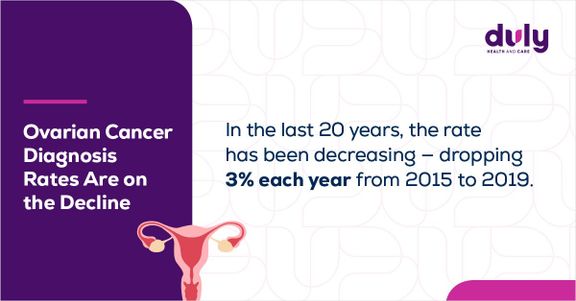When you think of different kinds of cancers, you might remember specific facts about them.
You might know that you should talk to your physician if you feel a lump in your breast, that lung cancer is typically caused by smoking, or that the age to get your first colonoscopy is now 45.
Compared to other common forms of cancer, many people don’t know a lot about ovarian cancer — and sometimes, what they know isn’t actually true.

In the last 20 years, the rate has been decreasing — dropping 3% each year from2015 to 2019.
Despite being the second most common gynecologic cancer in the US, there are a lot of myths and misconceptions about ovarian cancer. Here are the realities behind them.
Myth #1: Pap smears can detect ovarian cancer.
Reality: Pap smears are good at detecting cervical cancer, but they do not test for ovarian cancer. Ovarian cancer does not typically show up in routine pap smear screenings. For an ovarian cancer diagnosis, two specific tests are used: a transvaginal ultrasound (TVUS) or a CA-125 blood test.
Myth #2: Only older women are affected by ovarian cancer.
Reality: It’s true that ovarian cancer is more common in women between the ages of 55 and 64 years old, but it can affect women of all ages — even younger adults. It’s important to know the symptoms and risk factors that can come with ovarian cancer, no matter how old you are.
Myth #3: Ovarian cancer has no symptoms.
Reality: Ovarian cancer is often called the “silent killer” because its early symptoms are very subtle. For a long time, people thought that there were no symptoms associated with early ovarian cancer, but there are some symptoms that are more common in women who have ovarian cancer than those who don’t:
- Pain in your pelvis or abdomen
- Bloating
- Having trouble eating or feeling full too quickly
- Frequent or urgent urination
Ovarian cancer symptoms can be overlooked or ignored as unimportant. If you are experiencing any of these symptoms, talk to your Duly primary care physician or gynecologist.
Myth #4: Only women with a family history of ovarian cancer are at risk.
Reality: Most ovarian cancer cases are diagnosed in women who have no known family history of the disease. But, having a family history of the disease or certain genetic mutations (like BRCA1 and BRCA2) can increase your lifetime risk of developing ovarian cancer yourself. Talk to your primary care physician about your family’s health history for different cancers to ensure you receive the proper screenings when needed.
Myth #5: If you have ovarian cancer, you won’t be able to get pregnant.
Reality: You can still get pregnant if you have or have had ovarian cancer, but it may be more difficult. Treatment for ovarian cancer, such as some surgeries or chemotherapy, can affect how easy it is to get pregnant as well as increase the risk of your pregnancy. However, there are many options available, such as fertility preservation or using a surrogate, that can help people with ovarian cancer have children if they wish to do so. Before starting any form of treatment, talk to your cancer care team about any questions or concerns you might have about future fertility or pregnancy.
Myth #6: Having a hysterectomy eliminates the risk of ovarian cancer.
Reality: While a hysterectomy (removal of the uterus) can reduce your risk of ovarian cancer, it does not get rid of the risk entirely. Getting your ovaries removed also lowers your risk, but there is still a chance of developing ovarian cancer. It might seem like not having ovaries should mean you are unable to develop ovarian cancer. It is still possible because leftover ovarian cells can impact your peritoneum — the tissue that lines your abdomen — even after surgery.
Myth #7: Ovarian cysts always lead to cancer.
Reality: Not all ovarian cysts are cancerous. In fact, most ovarian cysts are benign and go away on their own without causing harm. However, some cysts may need further testing, monitoring, or surgical removal, especially if they don’t resolve after a few months or are particularly large.
Moving Past Myths and Misconceptions
There may be a lot of myths surrounding ovarian cancer, but it’s important to separate fact from fiction. When you know more about symptoms and risk factors, you can make informed decisions about your health and seek appropriate medical care.
Armed with accurate information, take some time to talk to your loved ones about ovarian cancer risks and symptoms. With the correct information, we can all work together toward earlier detection and better treatment options.
Health Topics:








